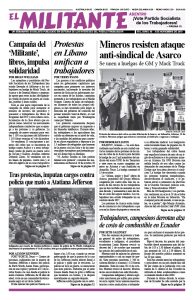November 7, 1994
UNITED NATIONS — “Not only has the economic, commercial, and financial blockade carried out by the United States against Cuba not been reduced in any way, but on the contrary, it has been strengthened.”
With these words, Fernando Remírez, permanent representative of Cuba to the United Nations, introduced a resolution opposing Washington’s 35-year embargo of the island. The resolution was approved in the UN General Assembly with 101 governments voting in favor, 2 opposed, and 48 abstaining. Only the representative of Israel joined Washington in voting “no.”
Remírez called for “the dismantling of the aggressive policy against Cuba, the backbone of which is the economic, commercial and financial blockade against my country.” An embargo, he added, “which is today being suffered by Cuba, but of which tomorrow any nation might be a victim.”
November 7, 1969
CLEVELAND — Carl Stokes, incumbent Democratic Party candidate for mayor, has agreed to debate Socialist Workers Party mayoral candidate Syd Stapleton before the City Club. As the campaign moves into its last week, it has gotten harder to differentiate between the positions of Stokes and [Republican] Perk.
Both candidates are hitting the “law-and-order” question equally hard. Recently Stokes has gone beyond calling for more police and suggested that the source of the problem is “permissive parents.” He has even indicated that the solution to the problem is “more whippings.”
On the [Case-Western Reserve] campus, there will be a mock election for mayor and a series of referendum-style questions on the war, Black control of the Black community, and lowering the voting age to 19 — a question that is on the general ballot.
November 4, 1944
Twenty-seven years ago on November 7, 1917 the chain of capitalism snapped in the Czarist Empire. Led by the Bolshevik Party of Lenin and Trotsky the Russian workers and peasants smashed the age-old tyranny of the capitalists, landlords and priests, and for the first time in history established the rule of the toiling people. The red dawn of that day ushered in a new epoch in the history of mankind.
The deeds of the Bolsheviks were as good as their declarations. Land to the peasants! Factories to the workers! All power to the working people! An end to the imperialist war! This program of the Bolsheviks became the law of the workers’ state in the Congress of the Soviets, under the guidance of Lenin’s party.
The Russian revolution awakened great hopes among the war-wearied masses on both sides of the trenches.

